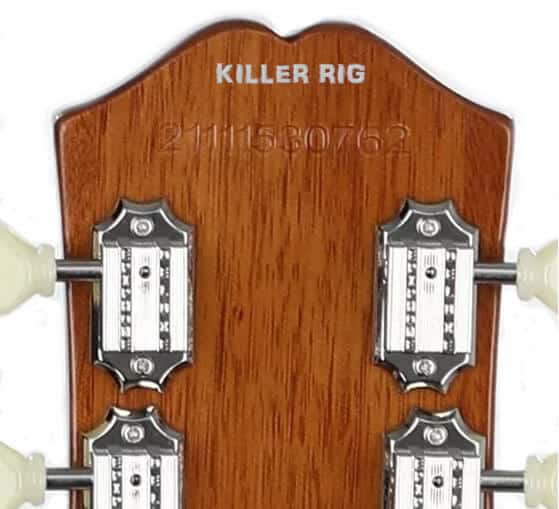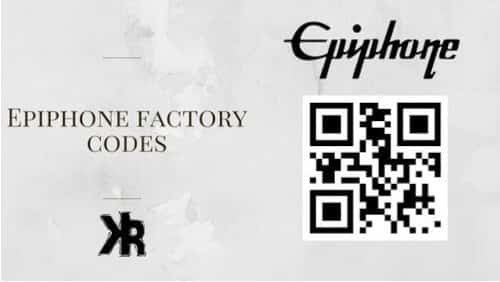Table of Contents
Did you know that every Epiphone guitar has a serial number or factory code on it? The factory code may not mean much to most players, but it can actually be quite interesting and provide some valuable information.
Moreover, these codes can be essential in helping you determine the guitar’s age. Plus the history associated with the instrument. This is very valuable if you’re ever in the market for an Epiphone.
We’ll go through the many Epiphone factory codes in this Killer Rig article, so you can figure out what they signify. We will also give some examples of how to make sense of these codes.
What are Epiphone Factory Codes?
Most Epiphone guitars have a code consisting of both letters and numbers. These codes are used to indicate the factory where the guitar was made, as well as the year it was manufactured.
For example, a code of SI02060234 has both letters and numbers. This tells us that the guitar was made at the Samick factory in Bogor, Indonesia (SI). The first two digits (02) indicate that it was manufactured in 2002.
Note: The serial number can vary due to the different factories used by Epiphone. For example, The letter count can be either one or two, and the numbers can be 4, 6, 7, 8, or 9 digits long. It’s possible that the code contains no letters at all!
How can you find the Epiphone Factory Code on your guitar?
Many Epiphone electric guitars have a serial code stamped on the back of the headstock. This multiple-digit serial number includes a lettered code.
This can be used to identify the factory it was made in. The code should be stamped into the wood, usually near the edge of the headstock.
If you own an acoustic guitar, this code will be found inside the body. Normally on a sticker that can be seen through the sound hole.
This is pretty standard with Epiphone acoustic guitars. But should yours not have the sticker, then it just might be on the headstock.
Epiphone Factory Codes By Number
If your serial number only contains numbers, here is how to decode it:
- 1st & 2nd Digit – Manufacturing year.
- 3rd & 4th Digit – Manufacturing month.
- 5th & 6th Digit – Factory Code.
- Last 5 Digits – Sequence Number.
For example, 10061503720 (11 DIGIT SERIAL).
In this case, the guitar is made in June 2010 inside the Qingdao factory located in China.
The table below has been created to provide the factory name and country based on these numbers. Find the 5th and 6th numbers in your serial number and compare them to this table:
| Factory Number | Factory Name | Country |
|---|---|---|
| 12 | DeaWon or Unsung | China |
| 13 | Unknown | China |
| 15 | Qingdao (electric) | China |
| 16 | Qingdao (acoustic) | China |
| 20 | Deawon or Unsung | China |
| 21 | Unsung | Korea |
| 22 | Unknown | Korea |
| 23 | Samick | Indonesia |
The image below is an example of what an Epiphone serial number looks like when it is all numbers:

Epiphone Factory Codes with Letters
If your serial number or factory code contains numbers and letters, here is how to decode them:
- First 2 Letters – Factory Code.
- 1st & 2nd Digit – Manufacturing year.
- 3rd & 4th Digit – Manufacturing month.
- Last 4 Digits – Sequence Number.
For example, SI02060234 (2 LETTERS – 8 DIGITS).
In this case, the guitar is made in June 2002 inside the Samick Bogor factory located in Indonesia.
Use the table below to locate the factory and country that your guitar was made in:
| Letter | Factory Name | Country |
|---|---|---|
| B | Bohemia Musico-Delicia | Czech Republic |
| C | Cort | Korea |
| CI | Cort | Indonesia |
| DW | DaeWon | China |
| EA | QingDao (Acoustic) | China |
| ED | Dongbei | China |
| F | Fine Guitars | Korea |
| FC | Fuji-gen (90) | Japan |
| GR | Farida, Guang Dong | China |
| IS | Samick, Bogor | Indonesia |
| SI | Samick,Bogor | Indonesia |
| L | Leader Musical Instrument Co Ltd. | Korea |
| J | Terada Gakki Seisakusyo | Japan |
| MC | Muse | China |
| P | Peerless | Korea |
| QG | Qingdao Gibson | China |
| S | Samick | Korea |
| SM | Samil | Korea |
| T | Terada Gakki Seisakusyo | Japan |
| UC | Unsung | China |
It should also be noted that some Elitist models have been given a “J” letter code. This is because they have been made in Japan.
Can I use the factory code to order parts from Epiphone?
Does your Epiphone instrument need repair or restoration work? You may be wondering if you can use the factory code to order parts from the company.
The answer is yes, you can use the code to order parts from Epiphone. Doing so can often be the best way to ensure that you get the right parts for your instrument.
When ordering parts from Epiphone, be sure to have the serial number of your instrument handy. This will help to ensure that you get what you need.
In addition, it’s always a good idea to consult with a qualified repair person. Well before ordering parts for your instrument. They can provide guidance on what is needed and how to properly install them.
Will The Serial Number Prove Originality?
There are a lot of Epiphone fakes being made and sold to look like the real thing. Many people try to verify if their Epiphone is original by using the serial number. But will the serial number alone prove that the guitar is original?
Unfortunately it won’t. You see, many of the factories making the fake guitars are using serial numbers similar to the real thing. This means you will have to do more research to prove originality.
This will mean confirming if the parts that were used are legitimate. Things like real Grover tuners and bindings that are not thicker than they should be.
Conclusion
As you can see, Epiphone Factory Codes identify the place where your instrument was made. Along with the factory code, the other digits included in the serial number are helpful too. They can tell you the month and year your guitar was produced.
Also, being aware of this information can give you a better understanding of your guitar’s history. It can tell you its place in the world of music.
So the next time you’re playing your Epiphone, take a look at the factory code on the back of the headstock. And see what hidden information it holds!

